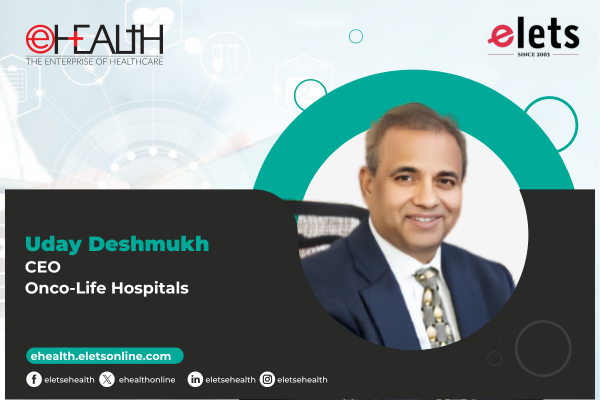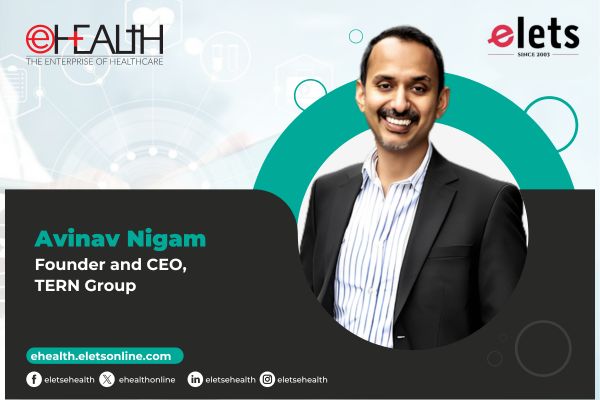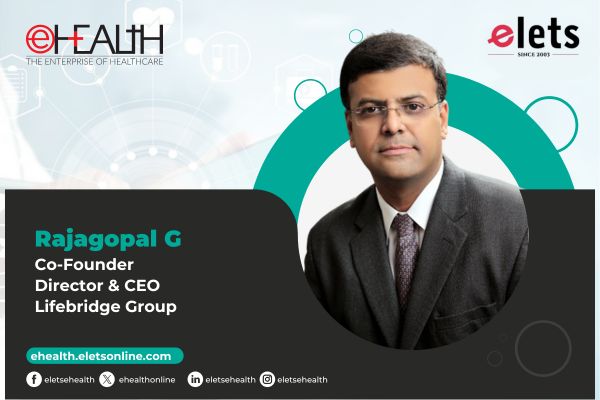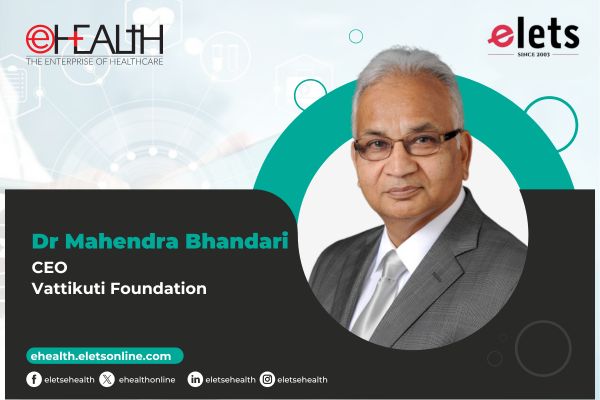
Gautam Khanna, CEO P. D. Hinduja Hospital & Medical Research Center finds National Health Assurance Mission (NHAM) as one of the positive proposed ideas by the government for the growth of the healthcare industry, in conversation to Elets News Network(ENN)
How do you see the healthcare industry with a year of Modi governance and what are your expectations for next year?

The Modis government has done well in raising the confidence of the industry and there is visible action on the ground. This will hope fully translate into benefits for the common man sooner than later. The multiple agreements with other nations will also help boost the economy and will help the country in general.

For the next year, the focus should be on fixing the issues in the domestic economy, working on improving the Ease of Doing Business Index for the country, encouraging the social sector and making healthcare a priority sector.

Have achche din arrived in the healthcare sector in India? If not, what is the reason and what are your expectations next year?

The Government had proposed many good ideas for the improvement and growth of the healthcare sector. The most promising of them was the National Health Assurance Mission(NHAM). It is intended to provide preventive healthcare, tertiary care and financial support to patients.Unfortunately, the project has been kept on hold. This has not only impacted the provision of health care to patients, but also the growth of private health insurance sector.
Also, the two per cent budget allocation to healthcare is not sufficient to provide affordable,quality healthcare to patients. The industry at present is struggling with poor health infrastructures and shortage of skilled manpower.
Reconsideration of NHAM and focus on improving access,appropriate regulations to ensure quality delivery, enhancement of initiatives for skill development, and standardised road map for IT-based health solutions is what we are from expecting next year.
Which are the areas of improvement that needs to be focused immediately in the healthcare sector?
The focus should be on improving access by incentivising setting up of hospitals in non-urban and metro areas, developing a Public-Private-Partnership (PPP) model with special incentives for not-for-profit hospitals,improve access to health insurance by linking to Jandhan scheme or Aadhaar card etc., and also increasing health awareness, focus on preventive health.
What are the top 10 issues do you think the health industry would emphasise the government to address? What will be the impact if these issues are not addressed immediately or vice versa?
There are various issues such as establishing India as the global hub for quality healthcare and medical technology, commitment to capacity building, favourable taxation policies with special focus on charitable hospitals, Government support to encourage R&D, providing an environment encouraging innovation in services and service delivery, healthcare funding to increase affordability of healthcare, regulations in medical devices, PPP models, incentives for private providers, especially not-for profit hospitals who work in are as which have been identified by the government as key focus areas, and IT in healthcare. It will be an economic loss to the country if disability-adjusted life year (DALY) increases and health is not a priority area.
How do you see the implementation of mhealth in the country? How much do you think will be the rate of adoption?
Currently, mHealth is in its nascent stage. It has been introduced to a separate public and private bodies but at a small and limited scale. With the growing penetration of mobile internet in urban and rural India,mHealth has a huge growth potential.
But we need a centralised body where the government plays the central role in imposing regulations and standards for health care delivery and information security. Also, PPP models will encourage innovation where private entrepreneurs come up with innovative solutions and public entities provide the scale and reach.
If we manage to provide personalised and quality health services to patients and ensure a security of confidential information, then the rate of adoption should be pretty high.
| Budget announcements – Key policy initiatives | |
| Some Key Initiatives | |
| Allocation of Rs 33,150 crore for the healthcare sector | |
| New scheme for providing physical aids and assisted living devices for senior citizens living below the poverty line | |
| Preventive health care under Swach Bharat Abhiyan for building awareness | |
| Rationalisation of conditions for FDI in the medical devices sector | |
| Social security schemes | |
| Pradhan Mantri Suraksha Bima Yojna to cover accidental death riskof Rs 2 lakh for a premium Rs 12 per year | |
| Pradhan Mantri Jeevan Jyoti Bima Yojana to cover both natural andaccidental death risk of Rs 2 lakh for a premium of Rs 330 per year for the age group 18-50 | |
| Atal Pension Yojana to provide a defined pension, where in the Government will contribute 50% of the beneficiaries premium limited to Rs 1,000 each year, for five years, in the new accounts opened before 31 December 2015 | |
| Senior Citizen Welfare Fund | |
| Unclaimed deposits of about Rs 3,000 crore in the PPF and approximately Rs 6,000 crore in the EPF corpus to be used for creation of a Senior Citizen Welfare Fund | |
| Opening of medical institutes | |
| All India Institutes of Medical Sciences (AIIMS) to be opened in five states namely J&K, Punjab, Tamil Nadu, Himachal Pradesh and Assam | |
| AIIMS like institute to be set up in Bihar | |
| National Institute of Pharmaceutical Education and Research to be set up in Maharashtra, Rajasthan and Chhattisgarh | |
| An Institute of Science and Education Research to be set up in Nagaland and Odisha | |
| Source: Grant Thornton |
The Modi government also announced to setup institutes on the lines of All India Institute of Medical Sciences (AIIMS) in five states Jammu and Kashmir, Punjab, Tamil Nadu, Himachal Pradesh and Assam.The six AIIMS established under the Pradhan Mantri Swasthya Suraksha Yojna (PMSSY) at Jodhpur, Bhopal,Patna, Rishikesh, Bhubaneshwar and Raipur are functional now.
According to industry analysts,health insurance market has grown at 30 per cent CAGR over last decade and the market is likely to pick up pace to reach Rs 390 Bn by 2019 and Rs 860 Bn by 2024. Increase in the Foreign Direct Investment (FDI) cap to 49 per cent, the insurance sector will encourage new entrants in the market.
The Union health ministry will be establishing the National eHealth Authority (NeHA) which will be responsible for an Integrated Health Information System (including telemedicine and mHealth).
Be a part of Elets Collaborative Initiatives. Join Us for Upcoming Events and explore business opportunities. Like us on Facebook , connect with us on LinkedIn and follow us on Twitter , Instagram.
"Exciting news! Elets technomedia is now on WhatsApp Channels Subscribe today by clicking the link and stay updated with the latest insights!" Click here!
















